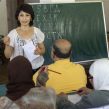
Adygea Can Accommodate Hundreds of Circassian Refugees from Syria
Publication: Eurasia Daily Monitor Volume: 10 Issue: 40
By:

On February 22, authorities in Adygea stated that the republic was prepared to receive more Circassian refugees from Syria. Republican official Fatima Paranuk stated that the authorities had compiled a list of vacant houses and land strips that can be handed over to the incoming refugees. There are about 500 such properties that can be shared with the repatriates from Syria they claimed. As of February, the official stated, 65 Syrian Circassian families have settled in Adygea, 54 of them in the republican capital Maikop and the rest in rural areas (https://www.regnum.ru/news/polit/1628617.html).
Adygea’s government organized special Russian language courses for the 379 Circassian repatriates in this republic of a half-million people. Some refugees left relatives back in Syria and are desperately trying to bring them to Adygea. “Some have no material means to return, others cannot leave their parents, and some are scared of the uncertainty [of emigration],” one of the Syrian Circassians explained to Kavkazskaya Politika website. According to Circassian activists in Syria, the situation in the country continues to destabilize. “We resettled about 1,200 people in the central part of Damascus,” an activist of the diaspora named Akram told the website. “There are four families living at my home currently. We are scared to come out into the streets. We Circassians do not bear arms, do not fight, but they do not ask us. Over 40 Circassians have died. Last week, two young people were killed.” The government of Adygea called on Moscow to increase its quota for immigrants to 2,000 people per year from the current 450. Moscow refused to increase the quota, according to Adygean government official Asker Shkhalakhov (https://kavpolit.com/limit-na-mirnuyu-zhizn/).
Circassian activists in the North Caucasus have lobbied the Russian government to organize a program for returning the Circassian diaspora in Syria since 2011, soon after the conflict there turned violent and hopes for a quick resolution were dashed. While Moscow has not officially denounced the Circassians’ claims and an official Russian delegation even visited Syria in March 2012, in practice Moscow has been very reluctant to allow any significant immigration of Circassians from Syria. Moscow may have been much more willing to dismiss the Circassians’ aspirations, but it does not want to antagonize a population in the restive North Caucasus region, particularly during the run-up to the Olympics in Sochi in 2014. Many Circassian activists in the North Caucasus have declared opposition to the Olympics. The activists say the games will be held in the land of “genocide,” where the Russian state exterminated and deported hundreds of thousands of Circassians in the 19th century.
Russia’s propaganda machine, which has tried to play down the historical hostilities between the North Caucasians and Russia, has advanced the thesis that there was a “voluntary accession” of Circassians into the Russian Empire in the 16th century. The dynastic marriage of Russian Tsar Ivan the Terrible and a Circassian duchess as well as communication between the Circassian nobility and the Russian tsar were presented as the historical basis for the concept of “voluntary accession.” This supposedly amicable relationship between historical Russia and Circassia did not explain, of course, why Russia decided to conquer this territory 300 years later, if Circassia was already part of Russia. The 450th anniversary of the “voluntary accession” to Russia was celebrated with great pomp in the three Circassian republics in 2007, despite protests by Circassian organizations (https://www.kavkaz-uzel.ru/articles/100068/).
Ironically, when the crisis with the Circassians emerged, Russia’s own propaganda backfired against its designers. The Russian law on compatriots allows the Syrian Circassians to return to their home in the North Caucasus under a simplified procedure, since they formerly lived in the Russian Empire. When Moscow realized this flaw in its strategy, the Kremlin changed its opinion about the Circassian “voluntary accession” to Russia in the 16th century and decided that the Syrian Circassians could not be Russian compatriots and that the law would not apply to them (https://kavpolit.com/limit-na-mirnuyu-zhizn/).
According to a Syrian Circassian returnee, Basel Gysh, the Syrian Circassians are still waiting for assistance from Russia to return to their homeland. Most of their suffering and casualties are caused by the Syrian army’s shelling and airstrikes of areas not considered government-friendly. Despite what some commentators have reported, only a handful of Circassians are well-positioned in the Syrian army, he said. Over 90 percent of the middle-aged Circassians in Syria speak Circassian and they have managed to retain their distinct culture. A majority of the Circassians stay out of the fighting in Syria, although small numbers of them are fighting on Assad’s and on the rebels’ side, Basel said. The Syrian Circassians have not adopted radical Islamist ideas, so their massive return to the North Caucasus would “vaccinate” the region against radical Islam, Basel argued (https://www.apn.ru/publications/article28572.htm).
The 2014 Sochi Winter Olympics provide Circassian activists with a unique opportunity to attract the world community’s attention to their plight. Moscow may try to blackmail the Circassians by threatening to bar the return of the Syrian Circassians to their homeland in the North Caucasus unless they explicitly support the Olympic Games in Sochi. However, the only hope the Circassians have, in fact, is to pursue both at the same time—to oppose the 2014 Olympic Games and also demand the return of the Syrian Circassians.




